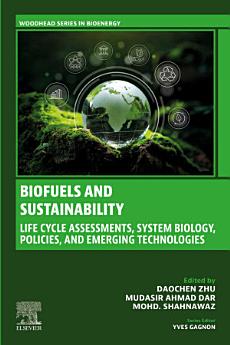Biofuels and Sustainability: Life Cycle Assessments, System Biology, Policies, and Emerging Technologies
About this ebook
About the author
Prof. Zhu has more than 15 years of teaching and research experience after obtaining PhD degree. Dr. Daochen Zhu is currently working as a Professor at Biofuel Institute, School of the Environment and Safety Engineering, Jiangsu University, Zhenjiang, China. He is a reviewer and editorial board member of various peer-reviewed journals of international repute. His research group mainly focuses on microorganism resource and diversity, Enzyme mediated valorization of lignin into value added commodity products, and biodegradation of organic pollutants. He is also interested in the mitigation of microplastic through bioremediation technology. Dr. Zhu has over 50 peer-reviewed publications, 12 patents, and 4 book chapters and three edited books to his credit with international repute.
Dr. Dar have more than 3 years of teaching and research experience after obtaining PhD degree. Dr. Mudasir Ahmad Dar is working as an Associate Professor, at Biofuel Institute, School of the Environment and Safety Engineering, Jiangsu University, Zhenjiang, China. He is currently working to design a novel biorefinery model adapted from the termite-bacteria symbiosis via biomimetic strategies. He completed his postdoctoral studies from the Jiangsu University, China. He has completed his masters in Zoology from University of Pune, Maharashtra with First Division. After completing his master’s, he pursued Ph.D. from the Savitribai Phule Pune University, Maharashtra, under the supervision of Prof. R. S. Pandit on the topic entitled, Bioprospection of symbiotic gut-bacteria from the snails for agro-waste disposal management. He is highly interested to work on Biofuels; Environmental biotechnology; Bioremediation, Systems biology; Gut-microbiome; Bioprospection; and modeling insects for biotechnological applications.
Dr. Shahnawaz have more than 6 years of teaching and research experience after obtaining his doctoral degree. Recently, Dr. Mohd. Shahnawaz got selected as an Associate Professor at Biofuel Institute, School of the Environment and Safety Engineering, Jiangsu University, Zhenjiang, China. In 2020, he got selected as a postdoc fellow at Yeungnam University, South Korea; however, due to the COVID-19 scenario, he was not able to join. He has several years of teaching and postdoctoral research experience. Dr. Shahnawaz worked on bioremediation of polythene at the Botany Department, SP Pune University, during his doctoral research with Prof. A. B. Ade. He is recipient of various fellowships awarded by the SPPU, UGC-BSR, UGC-MANF, and DST-SERB. His research interest is in Biofuels, Microbiology, Bioremediation, and Plant Biotechnology. Besides working on the bioconversion of lignocellulosic biomass into biofuels, he is also focused on the mitigation of microplastic using bioremediation technology.






